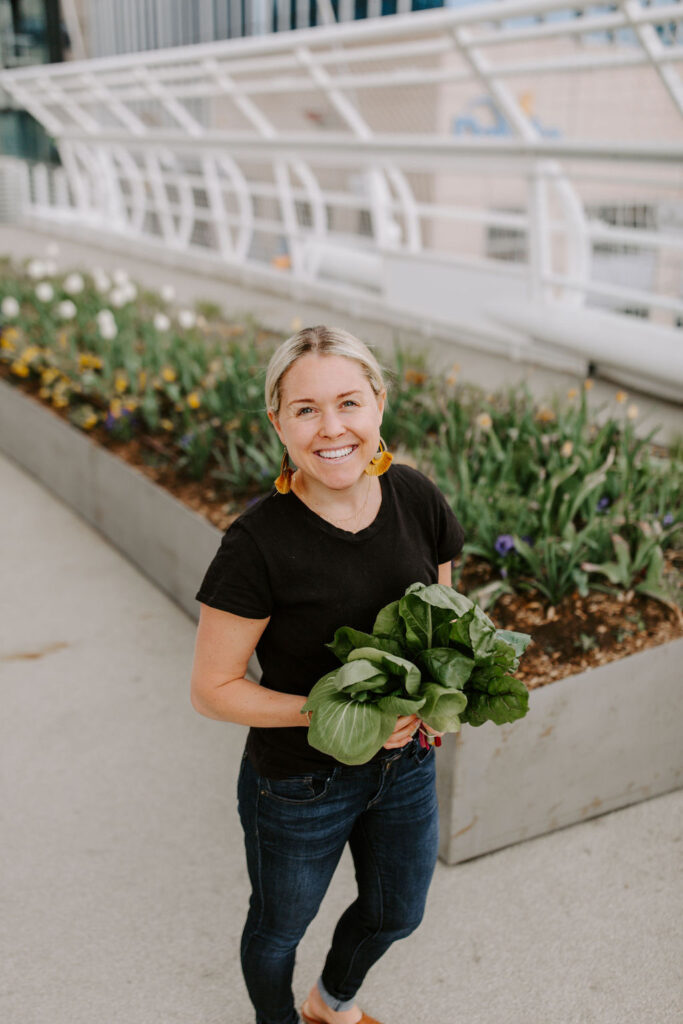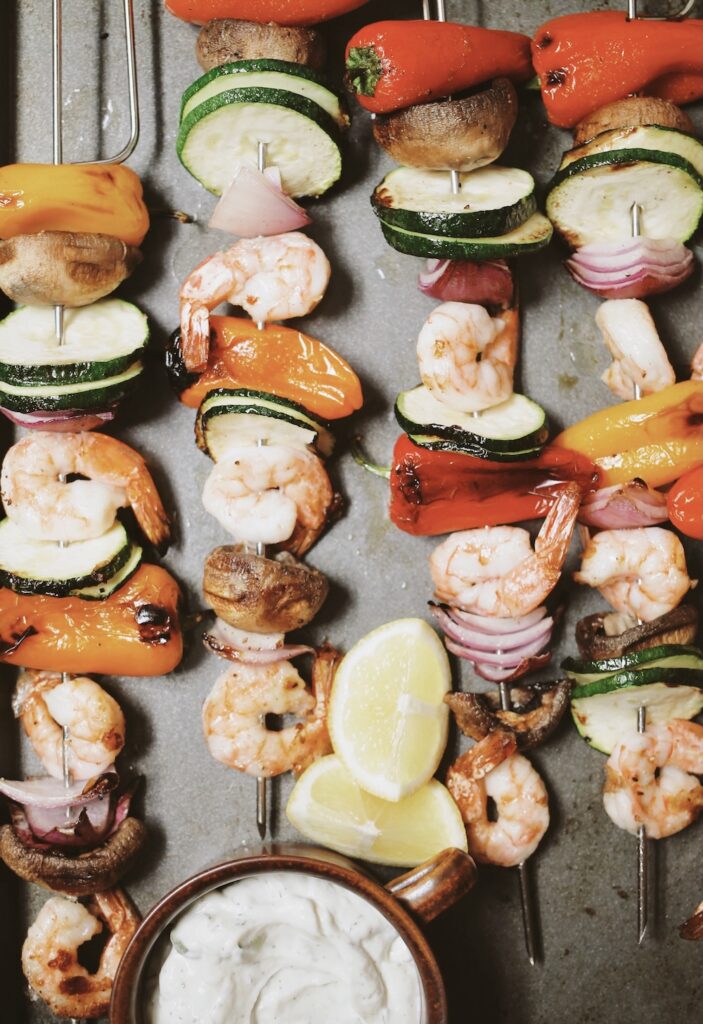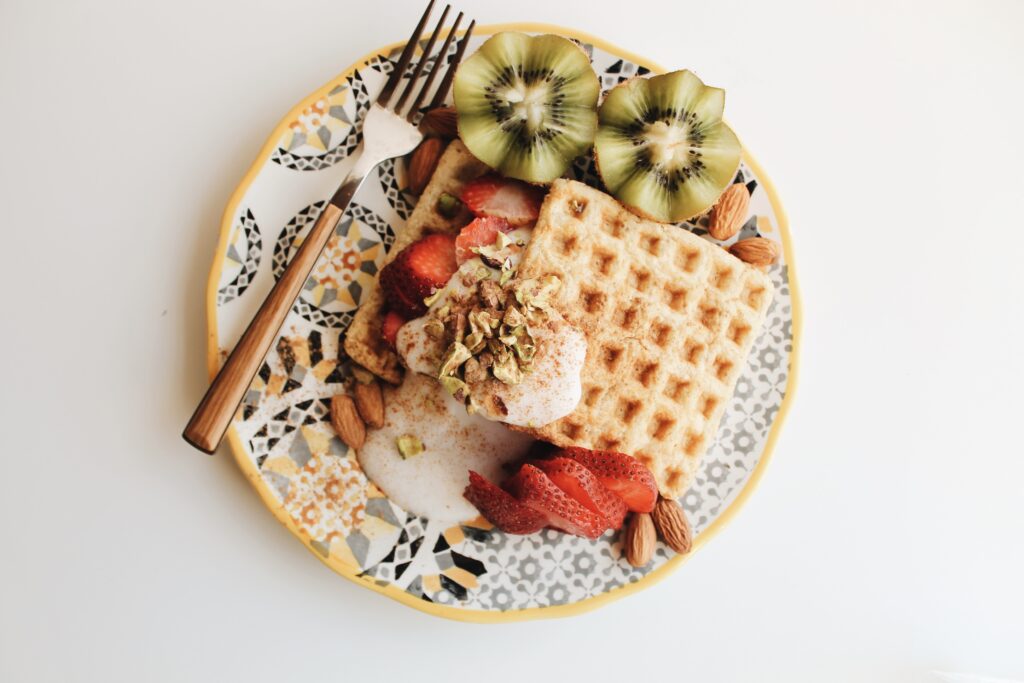Maybe it’s all those years spent under the relentless Colorado sun—or the exhaustive haze of raising a toddler—but my skin is beginning to show. Prioritizing the health of my skin has easily become a non-negotiable. Because let’s face it: we all want to age gracefully. Luckily, it’s never too late to take care of your skin (and get it checked!). But in many ways, healthy, radiant skin is a product of what’s happening beneath the surface. Lifestyle plays a significant role. From prioritizing sleep and exercise to eating anti-aging foods, consistent habits are key. Speaking of food, glowing skin begins with both what we eat and how we eat. In today’s article, we’re diving into the best diet for skin health. Good news: chocolate isn’t a known culprit.

Why Is Skin health Important?
We all know our skin is important. There’s no arguing that. It’s made up of water, proteins, lipids, and a variety of chemicals and minerals. Not only does it hold everything in, but skin plays a crucial role in providing an airtight, watertight, and flexible barrier—between the outside world and all of the systems within the body. As our largest (external) organ, it’s a defense against toxins. It also regulates our body temperature and aids in vitamin production.
effective skin care prevents premature aging
As a mom, I relish in the meditative and therapeutic process of cleansing, toning, and moisturizing. It’s one of my favorite forms of self-care. Ultimately, optimal skincare is crucial for maintaining skin’s healthy barrier—much of which can help delay the signs of aging. The dermis houses collagen and elastin, the proteins that offer support and elasticity. As we age, our skin is associated with progressive atrophy of the dermis. Therefore, preventative measures (like eating the best diet for skin health!) are key.
begin eating foods for healthy skin
For some, the first physical signs of aging can appear around age 25. Are you noticing issues such as dull skin, fine lines, wrinkles, fragile hair, brittle nails, and joint problems? While most think of aging in the form of fine lines and wrinkles, natural aging also affects a lot more: our energy levels, heart health, blood pressure, bone density, bowel function, body weight, and more. Ideally, you should start focusing on the best anti-aging foods by your mid-20s. But if you missed that boat, don’t worry. It’s never too late to make impactful changes.

Can what you eat impact your skin?
Yes. However, we are all bio-individuals—your wrinkles, decrease in elasticity, dryness, and breakout triggers might be very different from your coworker, best friend, or sibling. Simply observing how your skin reacts is key. Generally speaking, foods with a higher sugar content can cause a rise in insulin levels. When insulin is high, it alters other hormones that can affect the skin. More specifically, diet can impact the following:
Acne. Certain foods can promote inflammation throughout the body, thus triggering acne outbreaks. While the current research only detects an association between diet and acne—and not a causation—there’s still plenty of anecdotal evidence to suggest the correlation between food and breakouts. Interestingly, a relatively new study found a correlation between the chances of having acne and the consumption of the following: high-fat foods (including conventional milk and meat) and sugary foods and beverages.
Moisture levels. Drinking filtered water is one of the healthiest habits you can establish for your skin (and your entire body). When you drink water throughout the day, you are providing your inner organs and your skin with moisture that has been lost through sweat and other natural processes.
Wrinkles. When you eat a diet for skin health, you can reduce the premature skins of wrinkles. In fact, certain foods with healthy oils and omega-3 fatty acids support the building blocks of healthy cell membranes. These polyunsaturated fats also help produce the skin’s natural oil barrier, critical in keeping skin hydrated and plump. These oils and fats can be found in fish, nuts, olive oil, seeds, and more. By consuming these oily foods on a regular basis, along with high-quality proteins, you can help your skin’s collagen production. And by increasing your skin’s collagen production, your skin will be smoother and suppler. In turn, helping prevent premature wrinkles and skin sagging.
Melanoma. Too much ultraviolet (UV) radiation from the sun can damage DNA in your skin cells and cause skin cancer. Melanoma, specifically, is an intrusive form of skin cancer that often occurs from severe sun damage. However, a diet for skin health can help prevent contracting melanoma. Heart-healthy diets, complete with fatty fish, citrus, antioxidant-rich berries, leafy greens, and healthy fats have been found to protect your skin from melanoma.
foods to minimize for healthy skin
While the goal isn’t to remove these foods entirely (of course!), it’s helpful to understand how both sugar and high-glycemic foods can impact the health of your skin.
SUGAR
Speaking of insulin, sugar can be an acne culprit. When we consume refined sugar (think: cane sugar), we’re consuming refined carbs. And these carbs are quickly absorbed into our bloodstream, raising blood sugar levels. The increase in insulin levels also pushes the excess sugar into your cells, which can lead to inflammation and potentially turn into acne. When possible, opt for blood sugar-friendly sugars, like stevia, monk fruit, and coconut sugar.
HIGH-GLYCEMIC FOODS
Along with sugar, refined grains and refined white flour can make your blood sugar spike. That’s because simple carbohydrates, like white bread and pasta, are easier for your body to turn into glucose. Glucose is the sugar your body uses for energy. However, carbs that come from slowly-digested foods, like vegetables and whole grains, take longer to turn into glucose. Their fiber keeps them lower on the glycemic index. Routinely consuming high-glycemic foods, without pairing them with protein and healthy fats, can lead to raised blood sugar levels. Which can impact hormones. Insulin makes androgen hormones more active, leading to faster cell growth and sebum production–which leads to acne.

11 foods to eat for skin health
Full of color, texture, and many micronutrients, the best diet for healthy skin comes from real, whole foods.
Nuts
Many nuts, especially almonds, are a great source of vitamin E. Vitamin E can help repair skin tissue, retain skin moisture, and protect skin from damaging UV rays. Walnuts, too, can help strengthen skin cell membranes, protect against sun damage, and give skin a beautiful glow by preserving its natural oil barrier.
Seeds
Chia and flax seeds are rich in omega-3 and omega-6 fatty acids. These two healthy fats have been shown to help restore the skin’s moisture barrier, especially in those with dry skin conditions, such as atopic dermatitis and psoriasis. And don’t forget pumpkin seeds! Pumpkin seeds are a skin superfood. They’re high in zinc, and zinc protects your cell membranes, helps maintain collagen, and promotes skin renewal. Add them to trail mix, sprinkle them on your salads, toss them into smoothies, or eat them with fruit.
Avocado
When it comes to skin health, omega-3 fatty acids are key. Omega-3 fatty acids fight inflammation. Aim for a combination of EPA and DHA from salmon, walnuts, hemp hearts, chia seeds, ground flaxseed, and avocados. The high content of vitamin A in avocados can help shed dead skin cells, encouraging glowing skin. Their carotenoid content may also assist in blocking toxins and damage from the sun’s rays and also help to protect against skin cancers.
Bell Pepper
Red bell peppers, in particular, are loaded with antioxidants. And antioxidants reign supreme when it comes to anti-aging. In addition to their high vitamin C content (which is necessary for collagen production!), they contain powerful antioxidants. A bell pepper’s anti-inflammatory prosperities may help protect skin from sun damage, pollution, and other toxins.
Berries
Rich in vitamins A and C, as well as an age-defying antioxidant, called anthocyanin, berries (blueberries, to be specific!) help protect skin from sun damage, pollution, etc. Along with other antioxidant-rich produce, eating berries can increase your total antioxidant intake to help reduce premature aging. They also help prevent collagen loss.
Cruciferous veggies
In addition to leafy greens, cruciferous veggies (like broccoli and cauliflower) are an anti-inflammatory, anti-aging powerhouse. They’re packed with vitamins C and K, antioxidants, fiber, folate, and more. Your body needs vitamin C for the production of collagen, the main protein in the skin that gives it strength and elasticity.
Kefir
Probiotic foods—in general—are key for skin health. After all, an unbalanced gut can show on the outside, causing premature aging. So, how can you repair an unbalanced gut microbiome? Through fermented foods that encourage probiotic growth and help reduce toxic load. In addition to consuming kefir (I like to throw it into a smoothie), it’s effective when used externally, too. Kefir helps get rid of dead skin cells, restores the balance of beneficial bacterias on your skin, and stimulates the production of collagen, an anti-aging agent.
Papaya
The wide range of antioxidants in papaya helps to fight free radical damage and may delay signs of aging. Papaya also contains an enzyme called papain, which provides additional anti-aging benefits. It works as one of nature’s best anti-inflammatory agents. It comes as no surprise that papaya is also found in many exfoliating products.
Pomegranates
Like blueberries, strawberries, and kiwi fruit, pomegranates have been used for centuries as a healing medicinal fruit. High in vitamin C and a variety of potent antioxidants, pomegranates may protect our body from free radical damage and reduce levels of inflammation in our system. They also contain a compound called Punicalagins, which may help to preserve collagen in the skin, slowing signs of aging.
Sweet Potatoes
This comforting root vegetable is a great source of vitamins C and E—both of which may protect our skin from harmful free radicals and keep our complexion radiant. Sweet potatoes also stimulate the production of collagen and help minimize wrinkles.
Watercress
This nutrient-dense and hydrating green is a powerhouse vegetable. It packs several important nutrients but is extremely low in calories. It contains a plethora of antioxidants and minerals to support your skin (and help with reversing sun damage!).




Leave a Reply